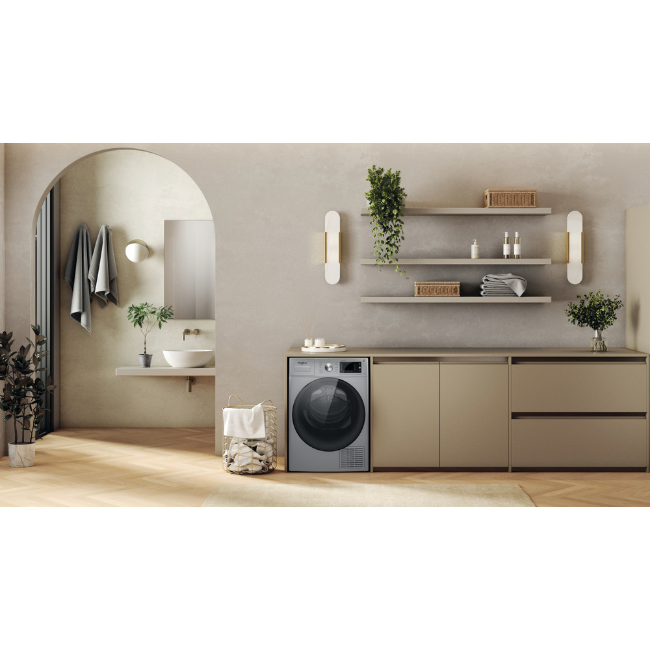
What Are the Advantages and Disadvantages of a Heat Pump Dryer?
What Are the Advantages and Disadvantages of a Heat Pump Dryer?
Heat pump dryers have gained significant attention recently as the tumble dryer market evolves to prioritise energy efficiency and sustainability. Following the EU's ban on the production of new vented dryers in January 2025, consumers are left with two primary options: heat pumps and condenser dryers. This shift has brought heat pump dryers into the spotlight for their advanced technology and cost-saving potential. But are they the right choice for you? Let's delve into the advantages and disadvantages of heat pump dryers and explore why they might be the future of laundry care in Ireland.
How Does a Heat Pump Dryer Work?
A heat pump dryer operates using a closed-loop system that efficiently recycles hot air to dry clothes. Unlike traditional vented dryers, which expel hot, moist air, heat pump dryers retain and reuse heat. This process consumes significantly less energy, making them one of the most eco-friendly options available today.
What are the Advantages of Heat Pump Dryers?
1. Energy Efficiency
One of the most significant benefits of heat pump dryers is their exceptional energy efficiency. These dryers use up to 50% less energy compared to vented or condenser models. This makes them ideal for environmentally conscious households and those seeking to reduce energy bills.
2. Lower Running Costs
Although heat pump dryers come with a higher upfront cost, the energy savings they offer over time make them a cost-effective investment. According to industry experts, households can save hundreds of euros annually on electricity bills, especially in Ireland where energy costs are a major concern.
3. Gentle on Clothes
Heat pump dryers operate at lower temperatures, which minimises the risk of overheating and damage to fabrics. Delicate garments such as woollens and silks benefit immensely from this gentle drying process, extending the lifespan of your clothes.
4. No Need for Ventilation
Unlike vented dryers, heat pump models don’t require an external vent. This means they can be placed anywhere in your home, provided there's adequate ventilation around the unit itself. This flexibility makes them ideal for modern Irish homes with limited space.
5. Environmentally Friendly
Heat pump dryers are not only energy-efficient but also align with broader sustainability goals. With the EU's focus on reducing carbon footprints, investing in a heat pump dryer is a step toward a greener future.
What are the Disadvantages of Heat Pump Dryers?
1. Higher Initial Cost
Heat pump dryers typically cost more than vented or condenser models. However, this initial expense can be offset by long-term savings on energy bills. Popular models from Miele and Bosch exemplify premium pricing for cutting-edge technology.
2. Longer Drying Times
Due to the lower operating temperatures, heat pump dryers take slightly longer to dry clothes compared to their vented counterparts. This may not be ideal for those who frequently need quick turnaround times for laundry.
3. Maintenance Requirements
The advanced technology in heat pump dryers requires regular maintenance, such as cleaning the filters and emptying the water reservoir. Neglecting this can impact the dryer's performance and efficiency.
4. Potential for Noise
Some users find heat pump dryers noisier than traditional models, although this varies depending on the brand and model. High-end brands like Whirlpool often incorporate noise-reduction technology to address this concern.
How Do Heat Pump Dryers Compare to Condenser Dryers?
Both heat pump and condenser dryers eliminate the need for external ventilation, making them suitable for versatile installations. However, the two differ significantly in terms of energy efficiency and drying technology.
Heat Pump Dryers: Recycle heat for maximum efficiency and lower running costs.
Condenser Dryers: Use a heating element that consumes more energy, leading to higher electricity bills.
To explore condenser dryer options, visit our condenser dryers category.
Why the EU Banned Vented Dryers
The EU’s ban on vented tumble dryers aligns with stringent energy efficiency standards aimed at reducing carbon emissions. Vented dryers were less energy-efficient and required significant amounts of electricity to operate, making them incompatible with the EU's sustainability goals. This policy shift means Irish households now need to choose between heat pump and condenser dryers.
Choosing the Right Dryer for Your Home in Ireland
For a range of high-quality heat pump dryers, including brands like Bosch, Whirlpool, and Fisher & Paykel, visit our dedicated heat pump tumble dryers category.
Heat pump dryers represent the future of laundry technology, offering energy efficiency, environmental benefits, and gentle care for clothes. While they come with a higher initial cost and longer drying times, the long-term savings and eco-friendliness make them a worthwhile investment. Whether you're upgrading your existing dryer or making a first-time purchase, explore the extensive range of heat pump dryers available at Joyces.ie to find the perfect match for your home.
